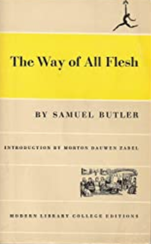A WRITER'S WIT |
My Book World

I found this late nineteenth-century novel fascinating for a number of reasons. First, Butler undertakes to explore the centuries-old problem of conflict between fathers and sons. The Pontifex family is indeed a family of priests (how audacious of Butler to further his satire by borrowing the word from Roman times). But dear young Ernest Pontifex does not want to follow in his father’s footsteps; and then he eventually does. For a while, anyway. Then he rebels big time, winding up in gaol for molesting a woman, at which time his parents disinherit him. Mr. and Mrs. Pontifex have taken the following line of thinking as they raise their children, including Ernest: “If their wills were ‘well broken’ in childhood, to use an expression then much in vogue, they would acquire habits of obedience which they would not venture to break through till they were over twenty-one years old” (22).
A number of sources advocate for the idea that Samuel Butler was gay, largely because he never married and seemed to maintain a number of close emotional relationships with men. If the subliminal crumb-droppings of this novel mean anything, Butler leaves all kinds of clues that this assertion may indeed be true (as does Maugham in his Of Human Bondage). Ernest’s father, Theobald, says the following: “It is an unnatural thing for a boy not to be fond of his own father. If he was fond of me I should be fond of him, but I cannot like a son who, I am sure, dislikes me. He shrinks out of my way whenever he sees me coming near him. He will not stay five minutes in the same room with me if he can help it” (122). Why is Ernest disposed toward this behavior? Probably because elder Pontifex beats Ernest for any number of reasons (his manipulating mother aids in this process). And which comes first, father’s rejection of son, or son’s rejection of father? When does the endless cycle of enmity begin? At any rate, many gay men are rejected by their fathers because they may see something in their sons that they do not like in themselves. Other clues? Ernest does not marry or marries badly (a bigamist, canceling his marriage) because he doesn’t get women; he has no positive feeling for women (especially his mother, though he forgives her in the end); but he does maintain longstanding relationships with various men throughout his life.
Yet, the most interesting aspect of the novel may be Butler’s treatment of the root of all evil, the way of all flesh: greed, the lust for money. Readers can locate the plot on the internet, but suffice it to say that Butler makes much (a biting satire) of the British notion of passing on wealth to one’s heirs, or not doing so, which action plays a large role in this novel’s satisfying climax and denouement (the elder Pontifexes get their comeuppance for their poor treatment of son Ernest).
Unlike other authors of this period, Butler writes for the most part in a manner that is simple and easy to follow, yet the novel is far from facile. Butler’s is a story that continues to unfold. It echoes throughout homes in England and around the world.
NEXT FRIDAY: My Book World | Benjamin Dreyer's Dreyer’s English: An Utterly Correct Guide to Clarity and Style



 RSS Feed
RSS Feed